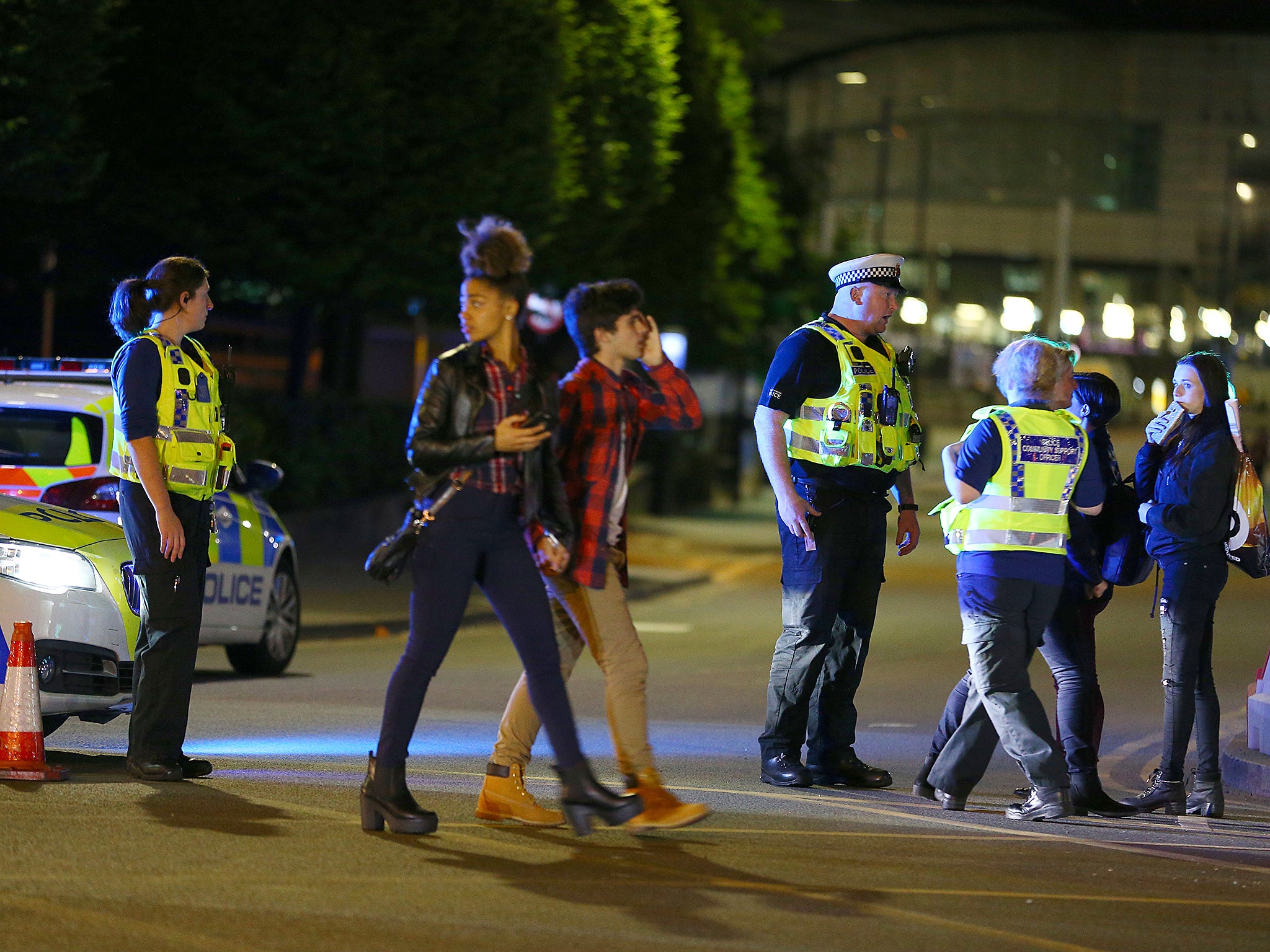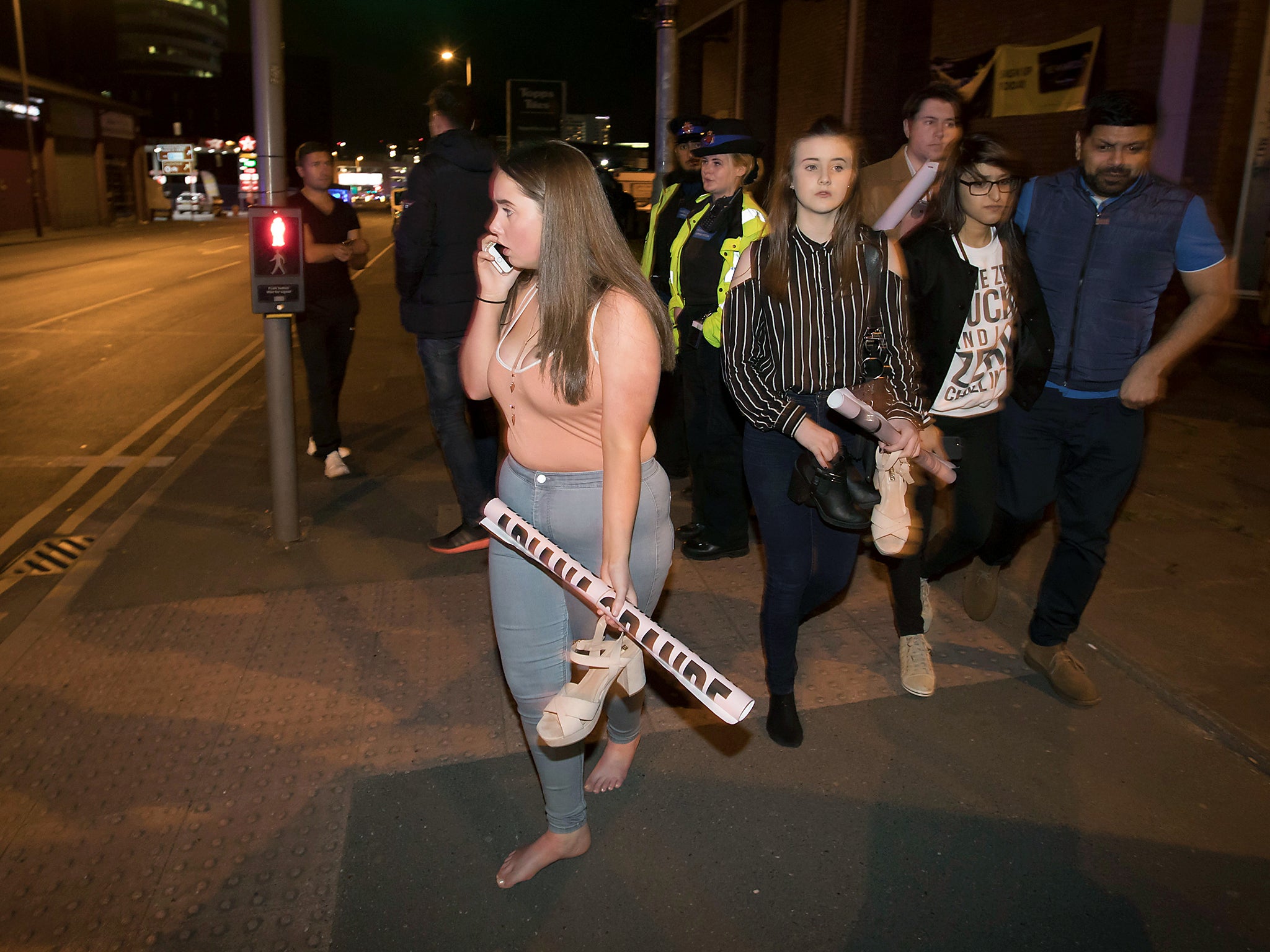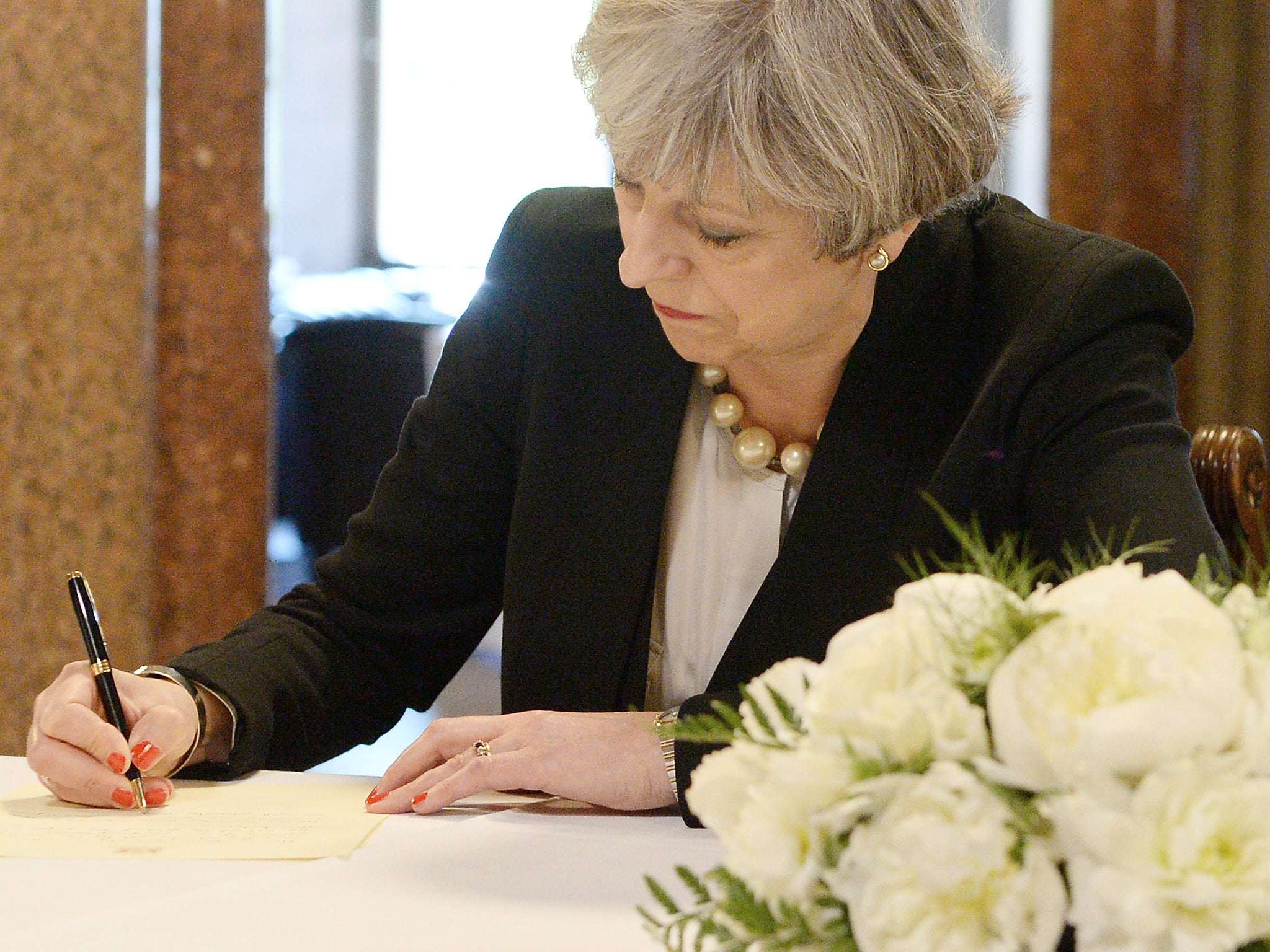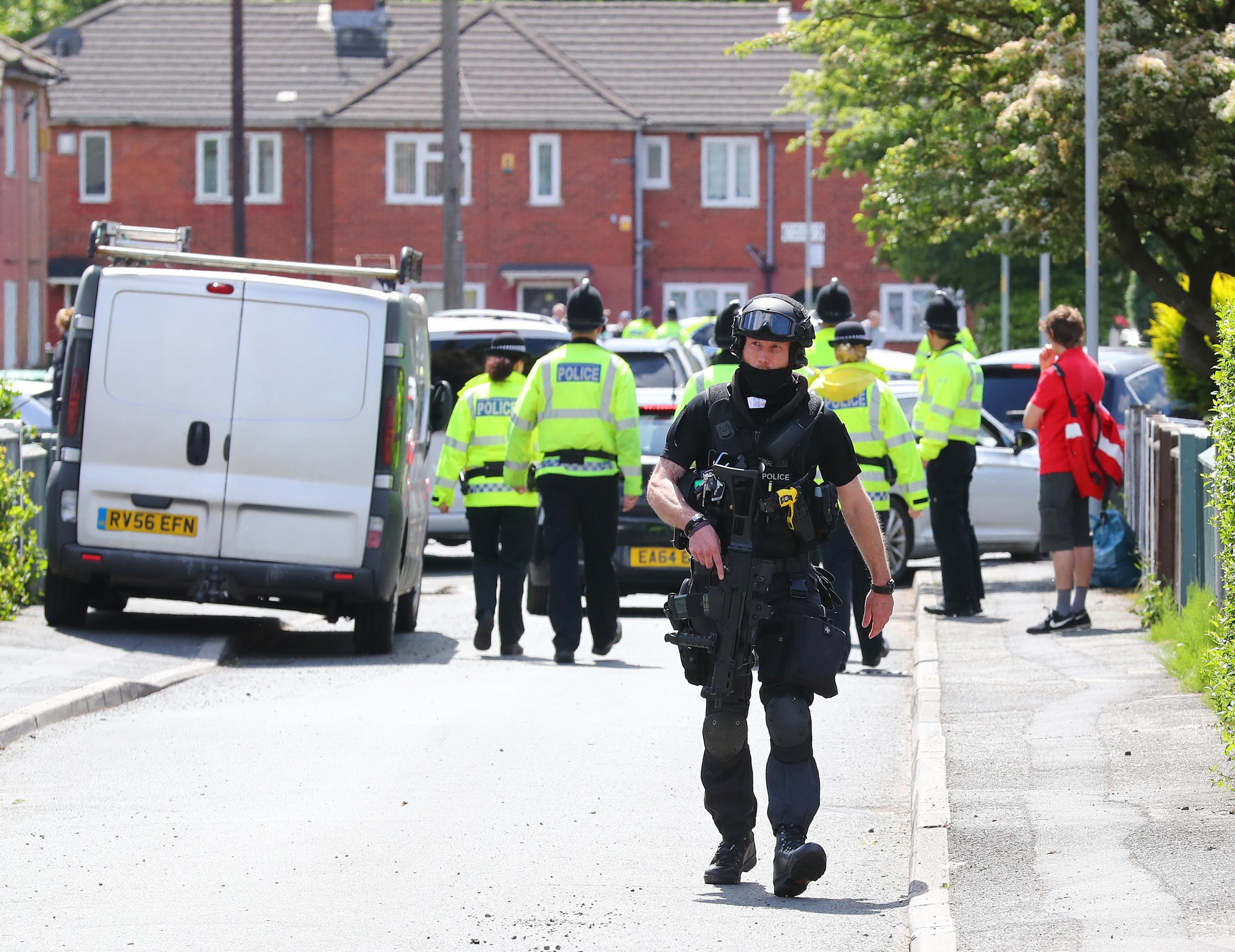'There were young children crying their eyes out': Survivors of the Manchester bombing relive the horror of the attack
Twenty-two people, many of them children, were murdered, and 59 wounded

Inside the arena, a sea of pink balloons; ‘Ariana superfans’ – girls, mainly – thrilled at seeing the star herself perform live; mums and dads proud to be taking their youngest, primary school age daughters to their first ever pop concert.
The killer could have been in no doubt he was targeting innocents.
Ariana Grande, at 23 not much older than her fans, gave a final “Bye bye Manchester!” The lights came on. The children and their parents started to file out of the Manchester Arena.
And then it happened.
Few seemed to realise what the noise was initially.
As the mum of one Ariana superfan put it: “You can’t comprehend somebody doing something as terrible as letting off a bomb.”
They thought it was a speaker exploding, or a dropped microphone.
Then the screaming of hundreds of panicking children told a different story.
“There were young children, terrified, crying their eyes out,” said John Young, who had been on the steps at the arena's main entrance with his wife and daughter.
“I saw an elderly man shaking,” he added. “All sorts. My daughter was in absolute bits. No nine-year-old girl should see anything like that.”
Another father reported hearing a bang and taking a lift to the arena exit: “When the doors opened I saw blood on the floor and two injured people. Blood all over their faces.”
Gary Walker, from Leeds, West Yorkshire, was closer still to the explosion. He and his wife were waiting to pick up his daughters Abigail and Sophie near the box office, in the foyer which connects with Victoria train and tram station.
He was, he estimated later, about three metres (10ft) away from where the suicide bomber detonated his device.
“There was a massive flash,” said Mr Walker, “And then a bang, smoke.
“I felt a bit of pain in my foot and my leg. I turned to my wife to see if she was all right. She said ‘I need to lie down’. She’d got a stomach wound and possibly a broken leg.”
His wife, he said, had been taken to hospital, but was “not too bad”. And he needed medical attention because “I’ve got a bit of a hole in my foot where I have been hit by some shrapnel”.
Sounding almost unnaturally calm as he spoke to BBC Radio 5 Live, Mr Walker added: “I’m surprised I got away so lightly.”
The bomber – Salman Abedi, a 22-year-old Mancunian of Libyan descent – had packed his device with nuts and bolts, intent on turning them into projectiles guaranteed to maim and kill: “dockyard confetti” one security expert called it.
Twenty-two people, many of them children, were murdered, and 59 wounded.
In the foyer, the bodies of the dead and the injured lay prostrate on the floor. Members of the public joined police and emergency services in tending to those still alive.
Barriers were used as makeshift stretchers to carry some away. A trail of blood on the floor suggested that at least one of the wounded had been dragged to safety.
Outside shocked teenagers were tended to by the emergency services, one still wearing her party bunny ears, another now wrapped in a silver foil blanket, still clutching her pink balloon.

In the fear and confusion, humanity asserted itself.
Seeing dozens of screaming teenagers fleeing the arena, passer-by Paula Robinson, 48, of West Dalton, swung into action. She took about 50 children who had been separated from their parents to a nearby hotel, publishing her phone number on social media and telling worried parents to contact her.
Rough sleeper Chris Parker was one of those tending to the wounded in the foyer. He had gone there to beg as the crowds filed out. Instead, he told reporters, he tended to a 60-something woman who died in his arms.
“I haven’t stopped crying,” he said.
Taxi drivers converged on the arena, giving free rides home to the survivors. Mum, dad, and 15-year-old daughter, mute, shocked and clinging to each other all the way back to Barnsley, one driver told The Independent.
The next morning, the drivers who hadn’t been on duty that night would drive to hospitals to give blood.
By lunchtime Manchester in the spring sunshine seemed almost normal, office workers eating sandwiches on benches in front of the neo-Gothic Victorian town hall.

But then you saw the TV news satellite trucks.
The appeals for news about the missing were all over social media now.
In the remote Hebridean island of Barra, Michael MacIntyre, a fish farm worker, pleaded for news of his daughter Laura, 15, who had travelled to the Ariana Grande show with her friend Eilidh MacLeod, 14. It had been his daughter’s first ever pop concert. He had been a little hesitant about her travelling so far from home, but Laura had seemed so happy about the prospect.
“Please … Please retweet,” read the father’s tweet. “Looking for my daughter and her friend.”
Only much later would the bittersweet news arrive. Laura was alive, but in hospital with serious injuries. Her friend Eilidh was still missing.
“We are still extremely worried,” said Angus MacNeil, who has represented Barra as SNP MP since 2005.
There had been no news yet either of Chloe Rutherford, 17, and Liam Curry, 19, from South Shields: “A great young couple, really loving, with a bright future ahead, nobody that doesn't like them," said Bernard Wills, 36, the cousin of Liam’s dad.
The concert trip, he thought "Was Liam's treat to Chloe this time. They'd gone down to enjoy a night away together.”
There was still hope, insisted Mr Wills:
"I'm sure there's a valid reason for them not getting in touch, people were dropping their phones as they were leaving or they've lost the battery on their phone."
The first of the dead to be named was Georgina Callander, 18. The night before the concert, the student at Runshaw College in Lancashire, had tweeted Ariana Grande: “SO EXCITED TO SEE YOU TOMORROW.”
The next name to emerge was that of Saffie Rose Roussos, a “beautiful little girl”. Eight years old.
She had been taken to the concert by her mum Lisa Roussos and big sister Ashlee Bromwich, who were both injured in the blast.
Chris Upton, the head teacher of Saffie’s primary school in the village of Tarleton, Lancashire, said her death was heartbreaking.
“Saffie was simply a beautiful little girl in every aspect of the word. She was loved by everyone.”
Amid the despair, there was, again, kindness, humanity.
Beside the police cordon, Manchester Cathedral organised a simple multi-faith prayer service ahead of the larger vigil planned for the evening.
With the cathedral itself sealed within the large area of the police cordon, they improvised. Two trestle tables borrowed from a nearby pizzeria served as an altar.
“Today, let us mourn, let us weep,” said Canon Pastor Marcia Wall. “Tomorrow, let us make this a compassionate world.”
Shortly afterwards, Nyomie Longworth, three, was allowed to play with a helmet borrowed from an indulgent police woman.
Her mum Paula, 38, a youth rugby coach, had come from Wigan, prevailing upon local shops to donate food and drink for the police officers guarding the cordon.

She had made a point of bringing Nyomie: “I want to bring her up with the charitable way of life.”
“If we stood by and did nothing to help,” said Martin Dowd, 37, her fellow food distributor, “We would be letting them think they had beaten us.”
In this instance “they” seemed to have consisted of Salman Abedi, until recently a resident of a “very neighbourly” area of Fallowfield, south Manchester.
Greater Manchester Chief Constable Ian Hopkins confirmed Abedi was suspected of being the bomber, while cautioning that he had not yet been formally identified.
Born in Manchester, it was thought Abedi was the second of four children born to mother Samia Tabbal and father Ramadan Abedi, who had fled the regime of Muammar Gaddafi.
Abedi – who had been a student at Salford University – was said by a childhood acquaintance to have seemed “a normal guy”.
He is said to have grown up in the Whalley Range area of the city, just yards from the local girl's high school which became the focus of attention two years ago after twin pupils Zahra and Salma Halane left home to travel to Isis-controlled territory in Syria.
Yesterday afternoon police carried out a controlled explosion at the modern, red-brick terraced house where Abedi lived, then began searching the property.
As the force helicopter hovered overhead, residents looked on in amazement.

“It's a very neighbourly area,” said Neville Edwards. “It's certainly not something you would expect in Fallowfield".
Salman Abedi, however, is thought to have been known to both the police and the security services. More questions may have to be asked about how he slipped through the net.
There was speculation, too, about whether he could have been a lone wolf.
The attack on a venue like the Manchester Arena seemed to require more planning than that. It certainly seemed a “step up” in sophistication from the Westminster attack where Khalid Masood had driven a hire car into pedestrians and used a knife to kill a police officer.
Police yesterday searched the home of Abedi’s brother Ismael in the Chorlton area of south Manchester.
They also arrested a 23-year-old man near an address where the family had previously lived. If the normal pattern of such terrorist attacks is followed, there may be more arrests to come.
A few hours after the Manchester Arena attack, Isis was claiming responsibility.
The English-language version of the terrorists’ communique seemed to think that a suicide bomb at a pop concert attended by teenagers amounted to placing explosive devices “in the midst of the gatherings of the crusaders”.
They called the perpetrator “a soldier of the caliphate”.
Hakan Dervish, 52, one of the taxi drivers who had gone to give blood, had a slightly different interpretation.
Turkish Cypriot-born, Manchester raised from the age of three, a Muslim, he said: “Those people don’t believe in the same god I do.
“The real Muslims are in the hospitals giving blood.
“This has nothing to do with religion. It really is just good against evil.”
Join our commenting forum
Join thought-provoking conversations, follow other Independent readers and see their replies
Comments
Bookmark popover
Removed from bookmarks